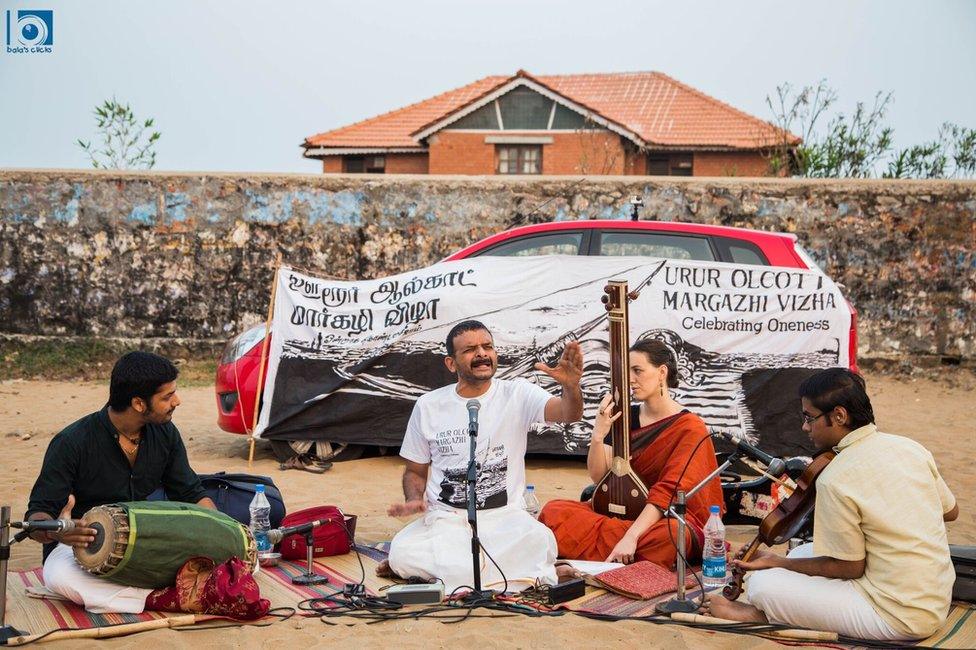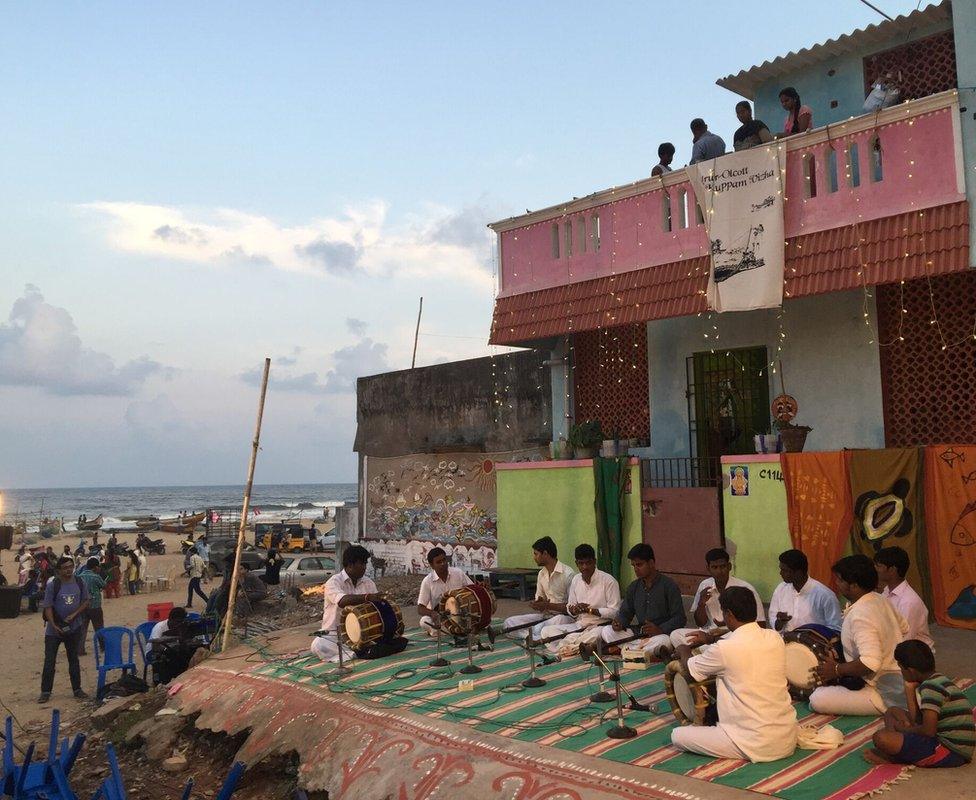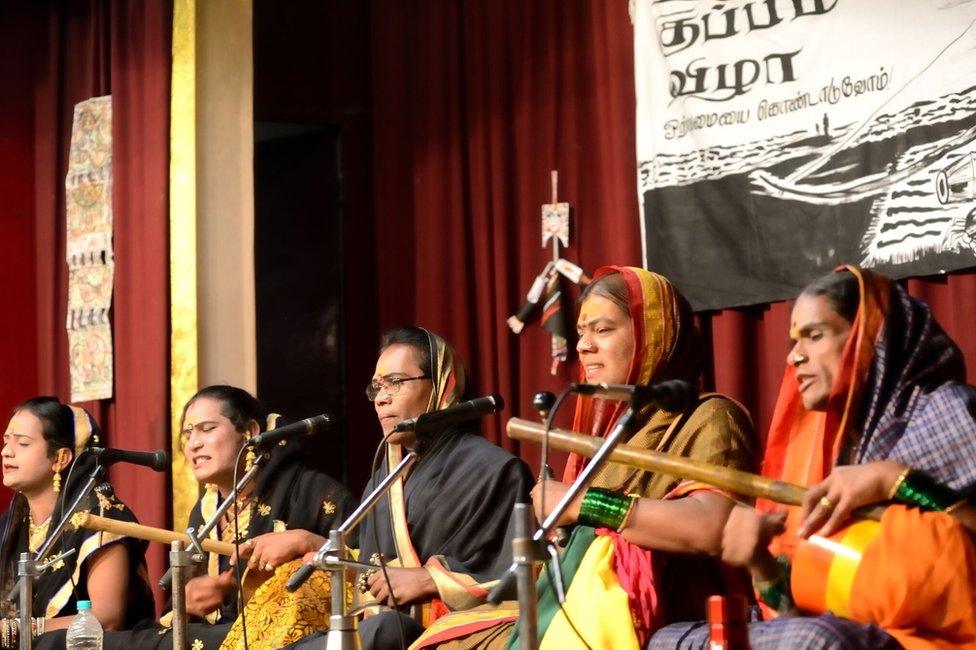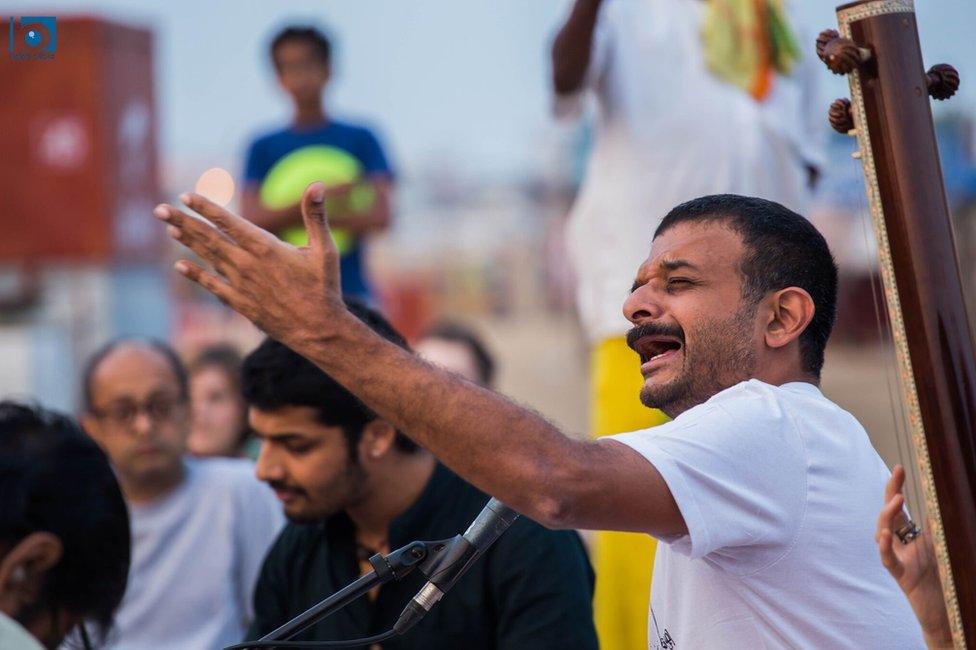How an Indian maestro is taking classical music to the masses
- Published

TM Krishna has criticised classical music for only catering to upper-caste clients
India's southern Indian city of Chennai (Madras) is witnessing a musical revolution of sorts.
Leading the way is celebrated classical musician and Ramon Magsaysay award winner TM Krishna.
The Carnatic music vocalist has critiqued the south Indian classical music industry for being under the dominant preserve of the upper-caste Brahmin community. He wants to create more inclusive egalitarian spaces where the arts of all communities come together in the city.
To that effect Krishna has been seen across Chennai, on various platforms, taking his music outside the hallowed portals of the city's prestigious sabhas or music halls, setting a personal example.
Krishna took his music, spoken of in sacred terms by most performers, to a fishing village on the shores of the Bay of Bengal in Chennai.
Open to the sky and sea, the entire village served as a concert hall for the alternate festival, the Urur-Olcott Kuppam Vizha that "celebrates oneness" this month.
Krishna has joined hands with Nityanand Jayaraman, a prominent social activist, to make the village a venue for holding open-air concerts with the aim of "bringing down barriers, equalising spaces and de-classing the arts".
"Krishna is using art to heal differences and break stereotypes and liberate the art to new spaces," says Mr Jayaraman.

Classical music concerts are now held in fishing villages in Chennai
The festival included a coming together of different forms of music and art alongside Carnatic music.
The music of the marginalised - devotional music by a community of transgender people and dirges of Chennai's slums, for example - are being taken to "a concert space for the first time," says Krishna.
He has even hosted "concerts in spaces symbolic of day-to-day life", such as in crowded public buses and and railway platforms across Chennai.
Krishna believes that this effort is an important step "in addressing many cultural and artistic hegemonies and hierarchies".
Unusual
Krishna is an unusual Indian maestro who has taken the traditionally upper-caste classical music to the lower-castes and disprivileged.
He has travelled to war-ravaged Jaffna in Sri Lanka to perform and engage with Tamil students.
And back home, he has engaged in unconventional activities, like setting the lyrics of song by a local alternate rock band called Kurangan to Carnatic ragas (The basic musical modes which denote "moods" in Indian classical music) and releasing a video to highlight the environment degradation unfolding in a local creek.
"Such collaborations from the traditional world of Carnatic music with other genres and current issues make it more accessible", says Kaber Vasuki of Kurangan.
Coming from the orthodox traditions of the south Indian classical music world, Krishna's outreach programmes are, many believe, a first of its kind.

Chennai's marginalised musicians are performing in public 'concert' places
David Shulman, one of the world's foremost authorities on the languages of India, writes of Krishna as one, "for who music is a medium for public moral statement and an instrument for making peace".
Krishna's Magsaysay award citation read that Krishna saw Carnatic music "was a caste-dominated art that fostered an unjust, hierarchic order by effectively excluding the lower classes from sharing in a vital part of India's legacy.
Politics of art
He has questioned the politics of art and made an active effort to widen his knowledge about the arts of the Dalits (formerly known as untouchables) and non-Brahmin communities.
Moved by the persecution of Tamil novelist Perumal Murugan whose writings on caste angered Hindu groups, Krishna set to music and sang an evocative poem of the writer.
Carnatic music, traditionally set to songs composed by Hindu devotional poets of the 17th Century and beyond, is a genre associated with southern Indian classical music.
Dated more than 2000 years ago, it evolved from the devotional canon of hymns and verses set to tune as musical prayer offerings in temples across southern states.
From the temples it found its audiences in the courts of kings and by talented performers.
Later it moved to concert halls across the southern cities. Chennai's famous Carnatic music "season" - held from December to January - is a century old.

Krishna wants to make classical music egalitarian
Musical concerts are held across Chennai and these concert halls are frequented by the upper castes as patrons and with predominantly Brahmin performers.
A century later Krishna is calling out his community of classical musicians to make their music more meaningful by sharing its beauty with all kinds of people.